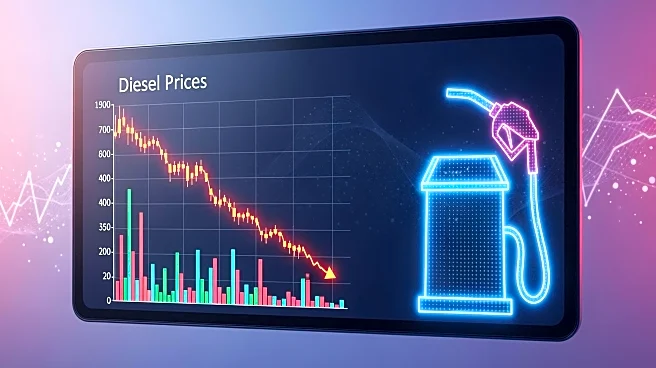What's Happening?
The Energy Information Administration (EIA) has reported a decrease in the national average price per gallon of diesel gasoline for the second consecutive week. For the week of October 13, the average price fell
by 4.6 cents to $3.665, following a 4.3-cent decrease the previous week. This decline comes after a period of increases, including a 0.005-cent rise for the week of September 29 and a 0.01-cent increase for the week of September 22. Despite these fluctuations, the annual average price has increased by 3.4 cents, which is lower than the 12.7-cent increase observed last week. Concurrently, West Texas Intermediate (WTI) crude is trading at $59.96 on the New York Mercantile Exchange, marking a decrease from $61.49 a week ago.
Why It's Important?
The decline in diesel prices is significant for the transportation and logistics sectors, which heavily rely on diesel fuel for operations. Lower fuel costs can lead to reduced operational expenses for trucking companies and logistics providers, potentially resulting in lower shipping costs for consumers. This trend may also impact inflation rates, as fuel prices are a key component of transportation costs that affect the pricing of goods. Additionally, the decrease in WTI crude prices suggests a potential easing of global oil market pressures, which could further stabilize fuel costs in the near term.
What's Next?
If the trend of declining diesel prices continues, it could provide relief to the transportation industry, which has faced challenges from fluctuating fuel costs. Stakeholders in the logistics sector may adjust their pricing strategies and operational budgets accordingly. Additionally, the ongoing changes in crude oil prices will be closely monitored by industry analysts and policymakers, as they can influence broader economic conditions and energy policies.
Beyond the Headlines
The fluctuations in diesel prices highlight the volatility of the energy market and its impact on various sectors. This situation underscores the importance of energy diversification and the potential benefits of alternative fuels in reducing dependency on traditional fossil fuels. As the industry adapts to these changes, there may be increased interest in sustainable transportation solutions and investments in clean energy technologies.












